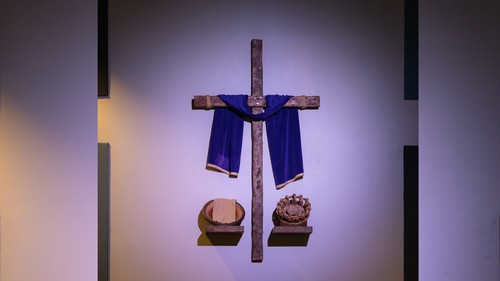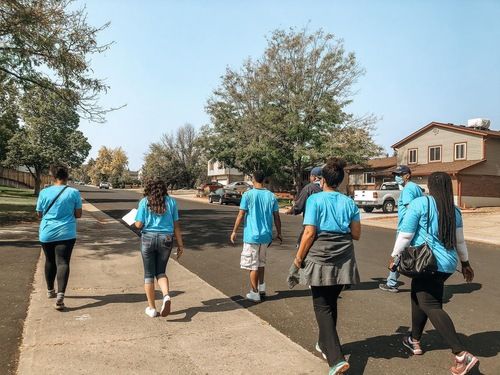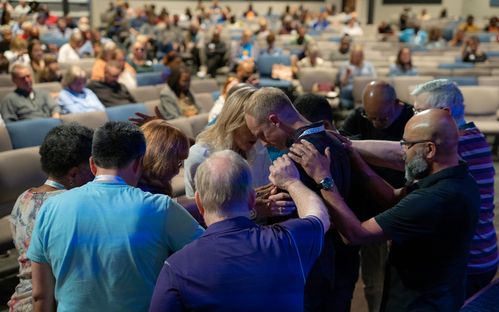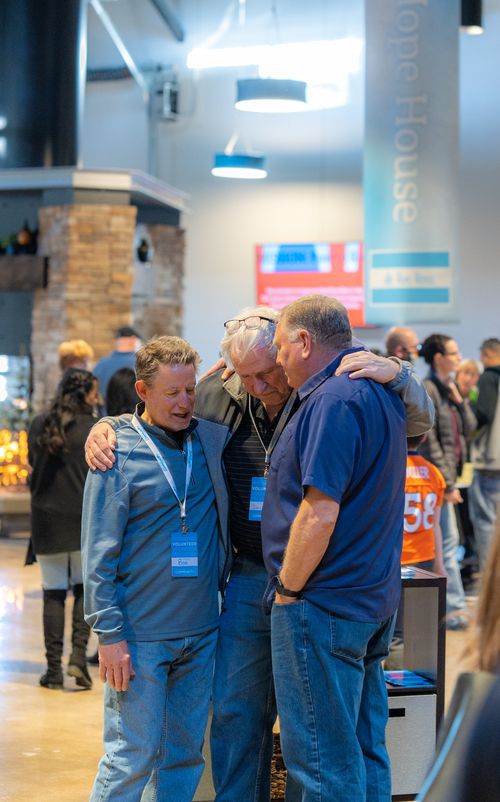OUR CONVICTIONS
WE BELIEVE THAT CHRIST LEADS HIS CHURCH
Therefore, we exist to glorify God by cultivating lives and hearts that are receptive to His leading. As a 21st century church with 1st century power, we rely on the power of the Holy Spirit, Grace, and the Gospel for the transformation of people into the image of Christ for the sake of others.
WE MEASURE OUR MISSION WITH TESTIMONIES OF TRANSFORMATION
Especially those new names written in the Book of Life, people growing in the fruit of the Spirit, and laying down tracks for individual ministry.
WE REACH OUT AS AN EXTERNALLY-FOCUSED BASE CAMP
A gathering place where Christ is worshiped, His Word is proclaimed, people are inspired, equipped and mobilized to serve Him, and where care, prayer, and family are available to all.
WE BELIEVE EVERY MEMBER IS A MISSIONARY
Therefore, we surrender the ministry of the Holy Spirit into the hands of an equipped congregation.
WE ARE INTERDENOMINATIONAL AND MULTI-CULTURAL
Therefore, we honor and celebrate our God-given cultural and denominational differences in all areas of our ministry.
WE BELIEVE IN GENEROUS LIVING
In an attempt to live open-handedly with the blessings of God, we give a minimum of 10% to God. Half is given to Colorado Community Church and the other half to ministries outside of it. We call this 5+5 Giving.
WE STRIVE TO WEAVE FABRICS OF FRIENDSHIP AND GROW FRUIT ON OTHERS’ TREES
Knowing that it takes the whole Church to reach the whole city, we seek to unify the Church to serve the needs of our community by building kingdom partnerships with other ministries.
WE PRACTICE A RESPONSIBLE USE OF RESOURCES
Therefore, we conduct our ministry in a manner that is cost-effective, yet thorough.
WE ARE A COVENANT COMMUNITY
God enters into relationships with His creation through covenant. Seeking to follow in His ways, we make promises to each other, and if (when) covenant is broken, we are quick to seek forgiveness and reconciliation, because ultimately, the world will know we are Christians by our love for one another.
Therefore, we exist to glorify God by cultivating lives and hearts that are receptive to His leading. As a 21st century church with 1st century power, we rely on the power of the Holy Spirit, Grace, and the Gospel for the transformation of people into the image of Christ for the sake of others.
WE MEASURE OUR MISSION WITH TESTIMONIES OF TRANSFORMATION
Especially those new names written in the Book of Life, people growing in the fruit of the Spirit, and laying down tracks for individual ministry.
WE REACH OUT AS AN EXTERNALLY-FOCUSED BASE CAMP
A gathering place where Christ is worshiped, His Word is proclaimed, people are inspired, equipped and mobilized to serve Him, and where care, prayer, and family are available to all.
WE BELIEVE EVERY MEMBER IS A MISSIONARY
Therefore, we surrender the ministry of the Holy Spirit into the hands of an equipped congregation.
WE ARE INTERDENOMINATIONAL AND MULTI-CULTURAL
Therefore, we honor and celebrate our God-given cultural and denominational differences in all areas of our ministry.
WE BELIEVE IN GENEROUS LIVING
In an attempt to live open-handedly with the blessings of God, we give a minimum of 10% to God. Half is given to Colorado Community Church and the other half to ministries outside of it. We call this 5+5 Giving.
WE STRIVE TO WEAVE FABRICS OF FRIENDSHIP AND GROW FRUIT ON OTHERS’ TREES
Knowing that it takes the whole Church to reach the whole city, we seek to unify the Church to serve the needs of our community by building kingdom partnerships with other ministries.
WE PRACTICE A RESPONSIBLE USE OF RESOURCES
Therefore, we conduct our ministry in a manner that is cost-effective, yet thorough.
WE ARE A COVENANT COMMUNITY
God enters into relationships with His creation through covenant. Seeking to follow in His ways, we make promises to each other, and if (when) covenant is broken, we are quick to seek forgiveness and reconciliation, because ultimately, the world will know we are Christians by our love for one another.
our imprint

Worship driven
Jesus was a worshiper. We see this clearly when Satan offered Jesus everything if He would just "bow down and worship" him. Jesus replied, "Away from Me, Satan! For it is written: 'Worship the Lord your God, and serve Him only.'" (Matthew 4:9-10)
Jesus used two specific words for worship in His response to the tempter: proskuneo, which means "to bow down" (literally, "to kiss toward"), and latreuo, which means "to serve." The perfect symbol of true worship is the towel and basin which Jesus used to wash the feet of His disciples (John 13:1-17). As we serve the practical needs of our neighbors, we bow down in honor of God. This expands our understanding of worship: it's more than a worship service. Literally, worship is service.
Following in the footsteps of Jesus, the early disciples were a worshiping community. They embodied Jesus as they gathered for prayer, praise, and the proclamation of the living Word. However, Jesus and the early disciples show us that worship was more than the songs they sang (Acts 2:42-47; 4:32-37). Worship is a way of life.
Jesus used two specific words for worship in His response to the tempter: proskuneo, which means "to bow down" (literally, "to kiss toward"), and latreuo, which means "to serve." The perfect symbol of true worship is the towel and basin which Jesus used to wash the feet of His disciples (John 13:1-17). As we serve the practical needs of our neighbors, we bow down in honor of God. This expands our understanding of worship: it's more than a worship service. Literally, worship is service.
Following in the footsteps of Jesus, the early disciples were a worshiping community. They embodied Jesus as they gathered for prayer, praise, and the proclamation of the living Word. However, Jesus and the early disciples show us that worship was more than the songs they sang (Acts 2:42-47; 4:32-37). Worship is a way of life.
Jesus lived in reliance on the Holy Spirit. The Spirit was present at His incarnation (Luke 1:34-35), descended on His baptism (Luke 3:21), and empowered His first sermon (Luke 4:18). When Jesus set out to fast for forty days, He was "led by the Spirit into the wilderness" (Matthew 4:1). The literal translation is: "Jesus set sail by the Spirit". This is the beauty of a Spirit-led life.
Jesus told the early disciples that they too were to live a life in response to the Spirit of God (the "wind" of God - John 3:8). In the book of Acts, we see the disciples waiting for and receiving the Spirit (Acts 1 & 2) and then living life with the sails of their souls filled with the Spirit (see for example: Acts 2:2, 4:8, 6:3-5, 7:55, 9:17, 11:24, 13:9 & 52).
Jesus told the early disciples that they too were to live a life in response to the Spirit of God (the "wind" of God - John 3:8). In the book of Acts, we see the disciples waiting for and receiving the Spirit (Acts 1 & 2) and then living life with the sails of their souls filled with the Spirit (see for example: Acts 2:2, 4:8, 6:3-5, 7:55, 9:17, 11:24, 13:9 & 52).

spirit led

Prayer Dependent
Jesus prayed constantly. During His baptism, we read, "As He was praying, heaven was opened" (Luke 3:21). Jesus prayed early in the morning and "often withdrew to lonely places and prayed" (Luke 5:15-16, & 4:42). Before He chose the twelve disciples, He "went out to a mountainside to pray, and spent the night praying to God" (Luke 6:12). Jesus lived a prayer-dependent life.
Prayer was an integral part of life for the first disciples. We read that "they all joined together constantly in prayer" (Acts 1:14) and "devoted themselves...to prayer" (Acts 2:42). They prayed when threatened, persecuted, or imprisoned (Acts 4:23-24, 31; 12:12). Prayer was a way of life for the early church (Acts 13:3, 16:25, 21:5), so much so that the goal for the Christian life was - and still is - to "pray without ceasing" (1 Thessalonians 5:17). For the disciples, the question was not "Did we pray today?" but, "Did we ever stop praying today?"
Prayer was an integral part of life for the first disciples. We read that "they all joined together constantly in prayer" (Acts 1:14) and "devoted themselves...to prayer" (Acts 2:42). They prayed when threatened, persecuted, or imprisoned (Acts 4:23-24, 31; 12:12). Prayer was a way of life for the early church (Acts 13:3, 16:25, 21:5), so much so that the goal for the Christian life was - and still is - to "pray without ceasing" (1 Thessalonians 5:17). For the disciples, the question was not "Did we pray today?" but, "Did we ever stop praying today?"
Jesus came to us "full of grace and truth" (John 1:14) and offered that grace freely to the hungry, broken, and marginalized. He gave second chances to those caught in sin and taught us that "My grace is sufficient for you, for My power is made perfect in weakness" (2 Corinthians 12:9; see also Luke 19:1-10 and John 7:53-8:11).
Early disciples were known for their grace. Stephen, for example, was a "man full of God's grace" (Acts 6:8) and demonstrated God's lavish love as he served the hungry. The apostle Paul, after encountering Jesus, became a herald for the incredible grace of God and proclaimed that grace in every one of his letters (see for example, Ephesians 2:8).
God loves you and there is nothing you can do about it!
Early disciples were known for their grace. Stephen, for example, was a "man full of God's grace" (Acts 6:8) and demonstrated God's lavish love as he served the hungry. The apostle Paul, after encountering Jesus, became a herald for the incredible grace of God and proclaimed that grace in every one of his letters (see for example, Ephesians 2:8).
God loves you and there is nothing you can do about it!

Grace Centered

Kingdom obsessed
Jesus' number one topic was the Kingdom of God. "The kingdom of God is like" was one of His favorite ways to begin a parable (see for example, Mark 4:26). Jesus promised the Kingdom and taught the disciples to pray for its arrival. The Kingdom was not just a message, but the message Jesus proclaimed, for He is "King of Kings and Lord of Lords" (Revelation 19:16). Jesus is, however, a different kind of King: He has a crown, but it is made of thorns. He has a purple robe, but it is soaked in His own blood.
Jesus' number one topic became the primary pursuit of the early church. They were obsessed with the Kingdom because Jesus had told them to "seek first His kingdom" (Matthew 6:33). We observe the disciples arguing and jostling for their spot in the coming Kingdom, and when Jesus rose from the dead, they asked, "Lord, are You at this time going to restore the kingdom to Israel?" (Acts 1:6). Even the thief on the cross requested, "Jesus, remember me when You come into Your kingdom" (Luke 23:42).
The early church defied the Roman Empire by proclaiming "Jesus is Lord" instead of "Caesar is lord" (Romans 10:9). "Maranatha!" (or "Come, Lord!" - see 1 Corinthians 16:22) was the heart cry of the early church. This mantra pointed to their eager anticipation of their coming King (Revelation 22:20).
Jesus' number one topic became the primary pursuit of the early church. They were obsessed with the Kingdom because Jesus had told them to "seek first His kingdom" (Matthew 6:33). We observe the disciples arguing and jostling for their spot in the coming Kingdom, and when Jesus rose from the dead, they asked, "Lord, are You at this time going to restore the kingdom to Israel?" (Acts 1:6). Even the thief on the cross requested, "Jesus, remember me when You come into Your kingdom" (Luke 23:42).
The early church defied the Roman Empire by proclaiming "Jesus is Lord" instead of "Caesar is lord" (Romans 10:9). "Maranatha!" (or "Come, Lord!" - see 1 Corinthians 16:22) was the heart cry of the early church. This mantra pointed to their eager anticipation of their coming King (Revelation 22:20).
Our imprint

Worship Driven
Jesus was a worshiper. We see this clearly when Satan offered Jesus everything if He would just "bow down and worship" him. Jesus replied, "Away from Me, Satan! For it is written: 'Worship the Lord your God, and serve Him only.'" (Matthew 4:9-10)
Jesus used two specific words for worship in His response to the tempter: proskuneo, which means "to bow down" (literally, "to kiss toward"), and latreuo, which means "to serve." The perfect symbol of true worship is the towel and basin which Jesus used to wash the feet of His disciples (John 13:1-17). As we serve the practical needs of our neighbors, we bow down in honor of God. This expands our understanding of worship: it's more than a worship service. Literally, worship is service.
Following in the footsteps of Jesus, the early disciples were a worshiping community. They embodied Jesus as they gathered for prayer, praise, and the proclamation of the living Word. However, Jesus and the early disciples show us that worship was more than the songs they sang (Acts 2:42-47; 4:32-37). Worship is a way of life.
Jesus used two specific words for worship in His response to the tempter: proskuneo, which means "to bow down" (literally, "to kiss toward"), and latreuo, which means "to serve." The perfect symbol of true worship is the towel and basin which Jesus used to wash the feet of His disciples (John 13:1-17). As we serve the practical needs of our neighbors, we bow down in honor of God. This expands our understanding of worship: it's more than a worship service. Literally, worship is service.
Following in the footsteps of Jesus, the early disciples were a worshiping community. They embodied Jesus as they gathered for prayer, praise, and the proclamation of the living Word. However, Jesus and the early disciples show us that worship was more than the songs they sang (Acts 2:42-47; 4:32-37). Worship is a way of life.

Spirit led
Jesus lived in reliance on the Holy Spirit. The Spirit was present at His incarnation (Luke 1:34-35), descended on His baptism (Luke 3:21), and empowered His first sermon (Luke 4:18). When Jesus set out to fast for forty days, He was "led by the Spirit into the wilderness" (Matthew 4:1). The literal translation is: "Jesus set sail by the Spirit". This is the beauty of a Spirit-led life.
Jesus told the early disciples that they too were to live a life in response to the Spirit of God (the "wind" of God - John 3:8). In the book of Acts, we see the disciples waiting for and receiving the Spirit (Acts 1 & 2) and then living life with the sails of their souls filled with the Spirit (see for example: Acts 2:2, 4:8, 6:3-5, 7:55, 9:17, 11:24, 13:9 & 52).
Jesus told the early disciples that they too were to live a life in response to the Spirit of God (the "wind" of God - John 3:8). In the book of Acts, we see the disciples waiting for and receiving the Spirit (Acts 1 & 2) and then living life with the sails of their souls filled with the Spirit (see for example: Acts 2:2, 4:8, 6:3-5, 7:55, 9:17, 11:24, 13:9 & 52).

Prayer dependent
Jesus prayed constantly. During His baptism, we read, "As He was praying, heaven was opened" (Luke 3:21). Jesus prayed early in the morning and "often withdrew to lonely places and prayed" (Luke 5:15-16, & 4:42). Before He chose the twelve disciples, He "went out to a mountainside to pray, and spent the night praying to God" (Luke 6:12). Jesus lived a prayer-dependent life.
Prayer was an integral part of life for the first disciples. We read that "they all joined together constantly in prayer" (Acts 1:14) and "devoted themselves...to prayer" (Acts 2:42). They prayed when threatened, persecuted, or imprisoned (Acts 4:23-24, 31; 12:12). Prayer was a way of life for the early church (Acts 13:3, 16:25, 21:5), so much so that the goal for the Christian life was - and still is - to "pray without ceasing" (1 Thessalonians 5:17). For the disciples, the question was not "Did we pray today?" but, "Did we ever stop praying today?"
Prayer was an integral part of life for the first disciples. We read that "they all joined together constantly in prayer" (Acts 1:14) and "devoted themselves...to prayer" (Acts 2:42). They prayed when threatened, persecuted, or imprisoned (Acts 4:23-24, 31; 12:12). Prayer was a way of life for the early church (Acts 13:3, 16:25, 21:5), so much so that the goal for the Christian life was - and still is - to "pray without ceasing" (1 Thessalonians 5:17). For the disciples, the question was not "Did we pray today?" but, "Did we ever stop praying today?"

grace centered
Jesus came to us "full of grace and truth" (John 1:14) and offered that grace freely to the hungry, broken, and marginalized. He gave second chances to those caught in sin and taught us that "My grace is sufficient for you, for My power is made perfect in weakness" (2 Corinthians 12:9; see also Luke 19:1-10 and John 7:53-8:11).
Early disciples were known for their grace. Stephen, for example, was a "man full of God's grace" (Acts 6:8) and demonstrated God's lavish love as he served the hungry. The apostle Paul, after encountering Jesus, became a herald for the incredible grace of God and proclaimed that grace in every one of his letters (see for example, Ephesians 2:8).
God loves you and there is nothing you can do about it!
Early disciples were known for their grace. Stephen, for example, was a "man full of God's grace" (Acts 6:8) and demonstrated God's lavish love as he served the hungry. The apostle Paul, after encountering Jesus, became a herald for the incredible grace of God and proclaimed that grace in every one of his letters (see for example, Ephesians 2:8).
God loves you and there is nothing you can do about it!

kingdom obsessed
Jesus' number one topic was the Kingdom of God. "The kingdom of God is like" was one of His favorite ways to begin a parable (see for example, Mark 4:26). Jesus promised the Kingdom and taught the disciples to pray for its arrival. The Kingdom was not just a message, but the message Jesus proclaimed, for He is "King of Kings and Lord of Lords" (Revelation 19:16). Jesus is, however, a different kind of King: He has a crown, but it is made of thorns. He has a purple robe, but it is soaked in His own blood.
Jesus' number one topic became the primary pursuit of the early church. They were obsessed with the Kingdom because Jesus had told them to "seek first His kingdom" (Matthew 6:33). We observe the disciples arguing and jostling for their spot in the coming Kingdom, and when Jesus rose from the dead, they asked, "Lord, are You at this time going to restore the kingdom to Israel?" (Acts 1:6). Even the thief on the cross requested, "Jesus, remember me when You come into Your kingdom" (Luke 23:42).
The early church defied the Roman Empire by proclaiming "Jesus is Lord" instead of "Caesar is lord" (Romans 10:9). "Maranatha!" (or "Come, Lord!" - see 1 Corinthians 16:22) was the heart cry of the early church. This mantra pointed to their eager anticipation of their coming King (Revelation 22:20).
Jesus' number one topic became the primary pursuit of the early church. They were obsessed with the Kingdom because Jesus had told them to "seek first His kingdom" (Matthew 6:33). We observe the disciples arguing and jostling for their spot in the coming Kingdom, and when Jesus rose from the dead, they asked, "Lord, are You at this time going to restore the kingdom to Israel?" (Acts 1:6). Even the thief on the cross requested, "Jesus, remember me when You come into Your kingdom" (Luke 23:42).
The early church defied the Roman Empire by proclaiming "Jesus is Lord" instead of "Caesar is lord" (Romans 10:9). "Maranatha!" (or "Come, Lord!" - see 1 Corinthians 16:22) was the heart cry of the early church. This mantra pointed to their eager anticipation of their coming King (Revelation 22:20).
